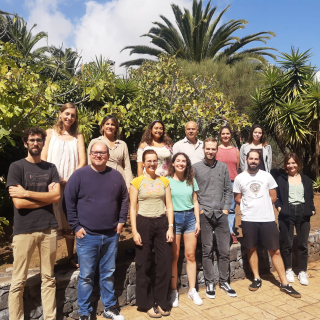Bibcode
Norris, Mark A.; Sharples, Ray M.; Bridges, Terry; Gebhardt, Karl; Forbes, Duncan A.; Proctor, Robert; Faifer, Favio Raúl; Forte, Juan Carlos; Beasley, Michael A.; Zepf, Stephen E.; Hanes, David A.
Referencia bibliográfica
Monthly Notices of the Royal Astronomical Society, Volume 385, Issue 1, pp. 40-52.
Fecha de publicación:
3
2008
Número de citas
51
Número de citas referidas
49
Descripción
We present a technique to extract ultra-deep diffuse-light spectra from
the standard multi-object spectroscopic observations used to investigate
extragalactic globular cluster (GC) systems. This technique allows a
clean extraction of the spectrum of the host galaxy diffuse light from
the same slitlets as the GC targets. We show the utility of the method
for investigating the kinematics and stellar populations of galaxies at
radii much greater than usually probed in longslit studies, at no
additional expense in terms of telescope time. To demonstrate this
technique, we present Gemini South Multi-Object Spectrograph (GMOS)
spectroscopy of 29 GCs associated with the elliptical galaxy NGC 3923.
We compare the measured stellar population parameters of the GC system
with those of the spheroid of NGC 3923 at the same projected radii, and
find the GCs to have old ages >10 Gyr, [α/Fe] ~ 0.3 and a range
of metallicities running from [Z/H] = -1.8 to +0.35. The diffuse light
of the galaxy is found to have ages, metallicities and [α/Fe]
abundance ratios indistinguishable from those of the red GCs.
Proyectos relacionados

Huellas de la Formación de las Galaxias: Poblaciones estelares, Dinámica y Morfología
Bienvenida a la página web del g rupo de investigación Traces of Galaxy Formation. Somos un grupo de investigación amplio, diverso y muy activo cuyo objetivo principal es entender la formación de galaxias en el Universo de una manera lo más completa posible. Con el estudio detellado de las poblaciones estelares como bandera, estamos constantemente
Ignacio
Martín Navarro